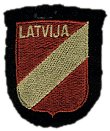Nuremberg Trials 1946
Lowenberg introduces and quotes an excerpt from the trial judgement.
Judgement September 30, 1946, page 521
At the Nuremberg trials of 30 September 1946, it was crystal clear: there were no heroes among the SS; there were no divisions that were deemed better than others but rather the SS as a whole was defined as a “criminal organisation.”
Much of the evidence and the argument has centered around the question of whether membership in these organizations was or was not voluntary; in this case, it seems to the Tribunal to be quite beside the point. For this alleged criminal organization has one characteristic, a controlling one, which sharply distinguishes it.... When an individual became a member of the SS, for instance, he did so voluntarily or otherwise, but certainly with the knowledge that he was joining something. Many of these men have made a mockery of the soldier’s oath of obedience to military orders. When it suits their defense they say they had to obey; when, confronted with Hitler’s brutal crimes, which are shown to have been within their general knowledge, they say they disobeyed. The truth is that they actively participated in all these crimes, or sat silent and acquiescent, witnessing the commission of crimes on a scale larger and more shocking than the world has ever had the misfortune to know. This must be said.
Examination versus September 30, 1946, page 516
Monica Lowenberg's position is in lockstep with Russian (and activist-adopted) propaganda, which denounces the Latvian Legion Waffen "SS" as the "SS" war criminals "convicted at Nuremberg."
The Latvian Legion were combat units deployed on the Eastern Front under the Wehrmacht. They received their orders and even combat pay from the Wehrmacht.
Their only relation to the convicted elite SS was the "SS" in their designations. Because they were not elite Nazi-party Waffen SS, a Latvian division could not be titled "SS Grenadier Division" as it would were it composed of Nazi Germans, but was titled "Waffen Grenadier Division der SS" — of the "SS", instead. It is a subtle, but essential, distinction.
More substantively, the Nuremberg trial recognized the difference between criminal organizations and those such as Legionnaires, largely conscripted, and who took no part in war crimes. Five pages earlier we find the following, specific to the SS:
Tribunal declares to be criminal within the meaning of the Charter the group composed of those persons who had been officially accepted as members of the SS as enumerated in the preceding paragraph who became or remained members of the organisation with knowledge that it was being used for the commission of acts declared criminal by Article 6 of the Charter or who were personally implicated as members of the organisation in the commission of such crimes, excluding, however, those who were drafted into membership by the State in such a way as to give them no choice in the matter, and who had committed no such crimes. The basis of this finding is the participation of the organisation in war crimes and crimes against humanity connected with the war; this group declared criminal cannot include, therefore, persons who had ceased to belong to the organisations enumerated in the preceding paragraph prior to 1st September, 1939.
Lastly, specific to the United States, Harry Rosenfield (Commissioner, United States Displaced Persons Commission, 1948-52), wrote to Julijs Feldmanis on September 12, 1950, quoting the decision of the Commission to adopt the motion:
"That the Waffen SS Units (Baltic Legions) are to be considered as separate and distinct in purpose, ideology, activities, and qualifications for membership from the German SS, and therefore the Commission holds them not to be a movement hostile to the government of the United Stated under Section 13 of the Displaced Persons Act, as amended."
